- Game Design and Strategy: Chess is renowned for its strategic depth and complex gameplay mechanics. Video game designers have drawn inspiration from chess when creating strategy games, particularly turn-based strategy and tactics games.
- Artificial Intelligence: Chess has been a testing ground for artificial intelligence (AI) development since the mid-20th century. The challenge of creating a computer program capable of competing with human grandmasters has driven advancements in AI techniques such as heuristic search algorithms and machine learning. These same AI techniques have been applied to develop intelligent opponents in video games, enhancing the realism and challenge for players.
- Influence on Gameplay Mechanics: Even in non-strategy genres, chess has influenced video game mechanics. For example, the concept of “turn-based” gameplay, where players take actions in sequence rather than simultaneously, can be traced back to chess.
- Cultural Impact: Chess has become a cultural touchstone that influences video game narratives and themes. Stories involving strategy, rivalry, and intellectual challenge often draw parallels to chess.
In summary, chess has influenced video games through its strategic depth, role in AI development, adaptations into digital formats, impact on game mechanics, and cultural resonance. Its enduring legacy continues to shape how games are designed, played, and perceived by gamers worldwide.
